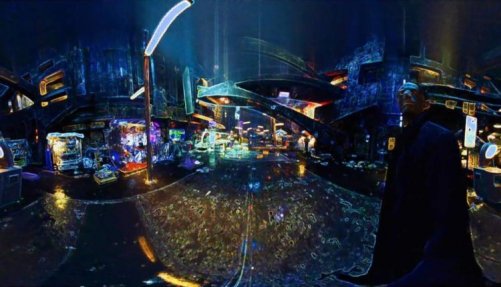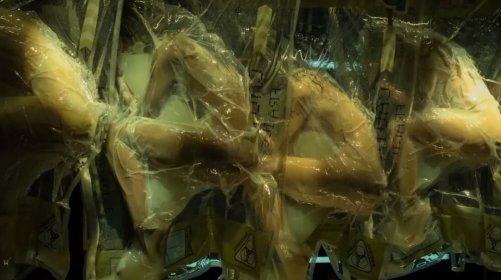Altered Carbon: The Relationship Between the Mind and an Altered Body

Imagine you’re in the 25th century. Humanity has spread throughout the whole galaxy under the supervision of the United Nations. Class, race, and religion divisions still exist. However, technological advances have redefined life. Now, human minds are stored on digital discs implanted at the base of the brain. That makes it easy to download them onto another body as if it were just a matter of changing cases for the brain. This is a description of the world that Richard K. Morgan created in his science fiction novel Altered Carbon.
The book was recently converted into a Netflix series. In this fictional world, the author delves into some of the future dilemmas humanity might face.
Among them, the relationship between the mind (or the soul) and the body is one of the most important. In a society where your mind can be downloaded onto a digital disc, what does that make of death? Is being in one body the same as being in another? What would the consequences of immortality be? These are some of the problems that you can consider when you enjoy the Altered Carbon book or Netflix show.

Altered Carbon‘s cortical stacks
In this dystopia, people can download the human mind onto a “cortical stack”. This stack is a piece of digital media that they can insert into the spinal column between the vertebrae. Within these lie all the memories of the person in question and their identity itself. They’re updated automatically along with the brain.
Then there are the sleeves. These are physical bodies. They can be natural or synthetic. This means that society can create them. Once a body dies, people can save a cortical stack indefinitely or put it into another sleeve. When someone saves the cortical stack, it can be loaded onto a virtual environment.
In this context, the people of this society don’t understand death as you do. The death of a body doesn’t necessarily mean that the identity of the person dies. Killing a body doesn’t mean death since the person in question can come back to life in another sleeve. “True death” only occurs when someone destroys the cortical stack. Can you imagine what implications that would have for people who believe souls go to heaven? And what about people who believe in the transference of souls?
The mind and body relationship
Philosopher Rene Descartes proposed a dualism between the soul – res cogitans – and the body – res extensa. This theory figures very prominently in Altered Carbon. Nevertheless, this distinction doesn’t exist in real life.
Neurologist Antonio Damasio makes it clear for you in his book Descartes’ Error. The mind and the body are one. You can’t learn without a body. Even if you managed to isolate the mind, it wouldn’t be able to learn anything because it would need the body. As Damasio said, “There’s no such thing as a disembodied mind. The mind is implanted in the brain, and the brain is implanted in the body”.
As such, the people of this fictional world would need a body to be conscious. Nevertheless, being in one body or in another isn’t the same thing. Changing the body leads to very strange feelings.
In the same way, self-concept and personal identity would be combined in a dramatic way if the new body were to be markedly different from the old one. Thus, it would also affect learning, the senses you would get wouldn’t be the same, and your interpretations of those senses would be changed. Ultimately, a change of sleeve would very possibly lead to trauma.

Implications of immortality in Altered Carbon
“Meths” are what they call people who have lived a long time in the series – hundreds of years. That’s an abbreviation of Methuselah, a biblical figure. They say Methuselah lived to be 969 years old. Even though living so long might seem a tempting choice at first, it may not be the case for the Meths. A Meth in the book tells you that “You needed a certain type of person to keep going, to want to keep going, life after life, sleeve after sleeve. You had to be different from the beginning. It didn’t matter what you would become as the centuries went by”.
As this quote states, not everyone has what it takes to be a Meth. Living so long involves many things, some bad and some good. You’d have to watch many of your loved ones die, including your children and grandchildren. Would you be able to handle that? Likewise, your relationships with younger people than you wouldn’t be the same: “You live that long, things start happening to you”.
“You get too impressed with yourself. Ends up, you think you’re God. Suddenly the little people, thirty, maybe forty years old, well, they don’t really matter anymore. You’ve seen whole societies rise and fall, and you start to feel you’re standing outside it all, and none of it really matters to you. And maybe you’ll start snuffing those little people, just like picking daisies, if they get under your feet.”
Imagine you’re in the 25th century. Humanity has spread throughout the whole galaxy under the supervision of the United Nations. Class, race, and religion divisions still exist. However, technological advances have redefined life. Now, human minds are stored on digital discs implanted at the base of the brain. That makes it easy to download them onto another body as if it were just a matter of changing cases for the brain. This is a description of the world that Richard K. Morgan created in his science fiction novel Altered Carbon.
The book was recently converted into a Netflix series. In this fictional world, the author delves into some of the future dilemmas humanity might face.
Among them, the relationship between the mind (or the soul) and the body is one of the most important. In a society where your mind can be downloaded onto a digital disc, what does that make of death? Is being in one body the same as being in another? What would the consequences of immortality be? These are some of the problems that you can consider when you enjoy the Altered Carbon book or Netflix show.

Altered Carbon‘s cortical stacks
In this dystopia, people can download the human mind onto a “cortical stack”. This stack is a piece of digital media that they can insert into the spinal column between the vertebrae. Within these lie all the memories of the person in question and their identity itself. They’re updated automatically along with the brain.
Then there are the sleeves. These are physical bodies. They can be natural or synthetic. This means that society can create them. Once a body dies, people can save a cortical stack indefinitely or put it into another sleeve. When someone saves the cortical stack, it can be loaded onto a virtual environment.
In this context, the people of this society don’t understand death as you do. The death of a body doesn’t necessarily mean that the identity of the person dies. Killing a body doesn’t mean death since the person in question can come back to life in another sleeve. “True death” only occurs when someone destroys the cortical stack. Can you imagine what implications that would have for people who believe souls go to heaven? And what about people who believe in the transference of souls?
The mind and body relationship
Philosopher Rene Descartes proposed a dualism between the soul – res cogitans – and the body – res extensa. This theory figures very prominently in Altered Carbon. Nevertheless, this distinction doesn’t exist in real life.
Neurologist Antonio Damasio makes it clear for you in his book Descartes’ Error. The mind and the body are one. You can’t learn without a body. Even if you managed to isolate the mind, it wouldn’t be able to learn anything because it would need the body. As Damasio said, “There’s no such thing as a disembodied mind. The mind is implanted in the brain, and the brain is implanted in the body”.
As such, the people of this fictional world would need a body to be conscious. Nevertheless, being in one body or in another isn’t the same thing. Changing the body leads to very strange feelings.
In the same way, self-concept and personal identity would be combined in a dramatic way if the new body were to be markedly different from the old one. Thus, it would also affect learning, the senses you would get wouldn’t be the same, and your interpretations of those senses would be changed. Ultimately, a change of sleeve would very possibly lead to trauma.

Implications of immortality in Altered Carbon
“Meths” are what they call people who have lived a long time in the series – hundreds of years. That’s an abbreviation of Methuselah, a biblical figure. They say Methuselah lived to be 969 years old. Even though living so long might seem a tempting choice at first, it may not be the case for the Meths. A Meth in the book tells you that “You needed a certain type of person to keep going, to want to keep going, life after life, sleeve after sleeve. You had to be different from the beginning. It didn’t matter what you would become as the centuries went by”.
As this quote states, not everyone has what it takes to be a Meth. Living so long involves many things, some bad and some good. You’d have to watch many of your loved ones die, including your children and grandchildren. Would you be able to handle that? Likewise, your relationships with younger people than you wouldn’t be the same: “You live that long, things start happening to you”.
“You get too impressed with yourself. Ends up, you think you’re God. Suddenly the little people, thirty, maybe forty years old, well, they don’t really matter anymore. You’ve seen whole societies rise and fall, and you start to feel you’re standing outside it all, and none of it really matters to you. And maybe you’ll start snuffing those little people, just like picking daisies, if they get under your feet.”
This text is provided for informational purposes only and does not replace consultation with a professional. If in doubt, consult your specialist.







